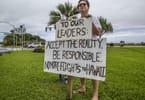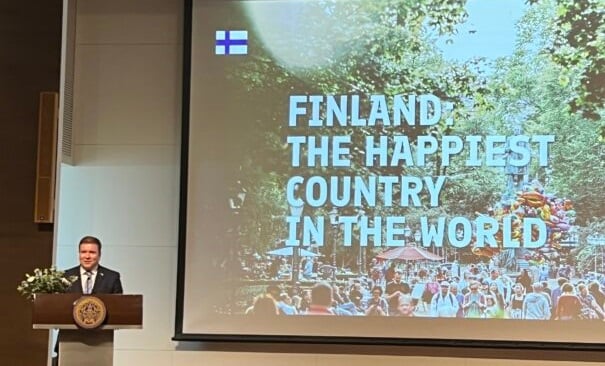- When the floods came, destroying fields, houses, public infrastructure, and human livelihoods, volunteers from near and far rushed to help for charity’s sake.
- People donated wholeheartedly.
- In areas ravaged by wildfires, brave firefighters, often hopelessly inferior to the power of firestorms, fought desperately day and night, until their complete exhaustion.
All of a sudden, egotism, hedonism and comfort zoning, otherwise deplored as signs of misbehavior, felt like evicted, giving way to nothing less but the desire to love your neighbor. Cataclysms create their own laws. Peace time has gotten its heroes, and in moments of danger and disaster people may show their other side – it may be their best.
The task is tough, setbacks are real, optimism is vital, though. Immediate emergency is prone to trigger first – and fast – aid, whereas developments that just gradually grow fatal are missing people’s full awareness to spark prompt action. Assets, gained step-by-step, will take their time to bear fruit, while individual opportunities for champions to ‘shine’ are in the wait.
Generally, heroism in peace time and less emergency may be less spectacular, but no less valuable (“heroic pacifism is undoubtedly imaginable,” says Albert Einstein). Peace is not a self-actor; peace is the result of our deeds. Needless to say that this provides a real challenge to Travel & Tourism executives as communication experts to act!
As travelers, we pay money for our holidays. That means we appreciate enjoying our holidays higher than the money we paid for that. We should know about the privilege of being our hosts’ guests. Social behavior is key to co-existence. On the other hand, if we – as hosts — feel that the hospitality we offer our visitors threatens to end up as a kind of hostile take-over by strangers, then our social self-confidence is severely violated. Creating violation and disharmony is another way to cause environmental pollution.
Our ‘eye’ for environmental consciousness and human empathy needs to be sharpened, in order to know what is good to both our physical (external) and psychic (internal) ‘environments.’ There is peace only, if deeply rooted inside ourselves as individuals, who share the sense of dignity with one another. Travel & Tourism provides the global stage for the good – or bad – practice. Somebody once said, it is like the eye which cannot see itself. It may learn to sensitize its view to its environment, similar to a photographer’s evolving talents.
Looking at Tourism’s high-flying claim to promote international understanding, we may find out: At its worst it’s a fake (e.g. all-inclusive travel!), at its best it’s wishful thinking. It feeds the myth shared by stakeholders that prejudice would disappear, and stirs up the silent hope shared by ourselves, the travelers, that exactly this would not happen, and we could afford to stand by our standardized opinions. Rather than locals, we meet compatriots. The intended bottom-up effect toward international understanding is minimal: Despite joining in sightseeing tours, enjoying the host’s culinary art or browsing through colorful shopping arcades, most holiday contacts are sporadic and casual only. They fade away with time, just as travel stereotypes sometimes do.
The outward appearance of ‘Tourism Unlimited’ has emerged due to the fact that formerly quite distinctive social markings have become blurred or wiped out entirely. Holiday destinations once considered exclusive are being offered now in any catalogue or website.
Some places have gone through an especially striking transformation, for instance Baden-Baden: Formerly reputed as ‘Europe’s summer capital,’ where the rich and beautiful were staging their own ‘Vanity Fair,’ the spa-city today is a site of convalescence and wellness even for clients on welfare. – Or choose Madeira, where at distinguished sanatoriums in a mild climate the world’s upper-classes once recovered: Today the island-state is a cruise and package-tour destination.
More crucial still, is the case of Venice: Distinguished as a UN World Heritage, Venice has been invaded until recently by short-term tourists from mighty cruise-ships threatening the lagoon city’s structural essence and local people’s easygoing serenity. Locals have regarded this kind of invasion as an attack – to their city and their social life.
The situation elsewhere looks similar: Angkor, once the glorious Hindu-Buddhist temple city of the Khmer kings, started to decay from the 15th century on and fell into oblivion. It is believed that climate change (!) and human hubris brought about Angkor’s downfall.
Only in the 19th century French explorers discovered the ruins and brought Angkor to daylight. In the wake of the Vietnam War, communist Khmer Rouges conquered them. Today, the Khmer Rouges have gone, and “hordes of monkeys and tourists” (Christopher Clark, Australian historian) have reconquered the impressive temple ruins of Angkor Vat and Angkor Thom.
In ‘Expansion du tourisme,’ Ms. Anita Pleumaon of the Tourism Investigation & Monitoring Team (tim-team) summarizes: “Modern values, imposed on Asian societies in rapid development, seem to have caused particularly devastating effects and a feeling of disorder, alienation, upheaval and incertitude. The process of commercialization and homogenization and the massive circulation of new ideas, pictures and information left little space to traditions, cultural expression, values of family and community.” Is our approach to destination building a double-edged sword since its logic and methodology follow western-style patterns? Are there commonalities between our compelling efforts of ‘destination building’ and the post-Cold-War concept of ‘nation building’?
The most brutal evidence of the incongruousness of western-style democracy and nation building could be witnessed in Afghanistan. Afghanistan, in the 1960s and 70s an exciting travel destination and a heaven for dropouts from Europe, had successfully prepared the ground for the defeats of two world powers: the Soviet army in 1989 and the U.S.-led NATO troops in August 2021. For the Soviets, Afghanistan was just a power play, for the U.S. and NATO it was the identified center of international terrorism and the hideout of Osama Bin Laden, the 9/11 top terrorist.
The goal of U.S.-NATO military intervention was to topple the then Taliban government and catch Bin Laden. Both missions were accomplished, but a more glorious challenge lured the Western alliance to “stay a while,” in order to consolidate Afghanistan as a Western-style democracy. This goal failed shamefully, the Taliban peasants’ militia returned and forced U.S. and NATO to leave Afghanistan harum scarum – with many dead, injured or traumatized, billions of dollars spent, and serious doubts left. They culminate in the everlasting but still unanswered question: What for?
Gloomy reminders of the Vietnam War have resurged. Pictures of the spectacular escape in helicopters from Saigon rooftops in 1975 were juxtaposed in 2021, to photos of the sky lifts from Kabul Airport, overcrowded with desperate people, some of them clinging to the undercarriage of the aircraft and falling…
Who is guilty? Who assumes responsibility? How about lessons learnt?
Responsible are all those who could not understand or refused to accept lessons that they should have already learnt earlier: first, societal patterns and social ways of life cannot be transferred upon others by force – nowhere and not at all in Afghanistan; second, the job of the military is to wage war, and not to build up schools, hospitals, and to ditch wells; third, both military and civil projects need a stringent and timely fixed vision, or objective that would have to be made everyone’s cause — and not just well intended procedures with an open end and a lot of lofty illusions; forth, intertwined relations between local elites and foreign partners have a strong tendency to further nepotism and corruption. This kind of ‘liaisons dangereuses’ will inevitably lead to conflict or even war and cause naked chaos at last.
Too often, after a halfhearted yet long-term military commitment, foreign partners’ best choice seems to leave the scenario – with the repeated experience of a shameful flight, rather than an orderly departure, yet now hopefully with the main lesson learnt: to keep out of other countries’ internal issues, especially when socio-cultural differences are too hard to shun out. The English-Dutch author Ian Buruma refers to ‘the colonial trap’ great powers are prone to fall into, then and now.
Is it too far-fetched to also apply the ‘colonial trap’ thesis for development aid NGOs? The objections development aid faces largely target the perennial character of many technical projects, with high-flying intentions but little tangible results only. It is true that foreign experts may act beneficially not only as hands-on support and trainers, but also as trustworthy mediators between rivaling local interest groups. Tourism development in its varied contents and parameters is anything but exempt. Alas, the temptation is real that one gets too much involved in a host-country’s internal affairs, and an expert’s departure may only visualize the fact that he or she had become part of the problem, rather than its solution.
Usually it is highly appreciated to pronounce words clearly yet given the ironic perception of etymological commonality of ‘Tourism’ and ‘terrorism,’ slurring may be fatal: Tourism loves freedom, terrorism needs hate. Tourism, in its most negative expression, may kill local culture softly, whereas terrorism kills immediately, both targeted and at random, without mercy, yet with Tourism as one of its first victims.
Tourism cannot bloom, where terrorism rages, Tourism needs peace. How can we say that Travel & Tourism effectively contributes to create and maintain peace? Has anyone ever heard of a substantial role that a Tourism organization, jointly with others, has played, in an effort to keep, say, Afghanistan a peaceful and even tolerant country and Tourism destination, the way it used to be in the sixties?
Some two decades after the war, Vietnam has become an attractive travel destination, even with a communist regime in a capitalist setting (!), and friendly relations with the U.S. and the world. Political negotiations, business companies’ networking, and President Clinton’s historic visit in 2000 made normalization of government and business sector relations their mantra. Travel & Tourism was following suit, yet preceding steps that might have shown the commitment of UNWTO or WTTC are hard to recall.
Can we take Vietnam as a daring blueprint for ‘normalization’ of relations with the Afghanistan Emirate? May we expect adventurous mountain tourism in the Hindu Kush again around the 2040s – with Islamist Talibans as friendly tour guides?
Crazy enough, one might think, shaking the head – for twenty years after the Vietnam War, Samuel P. Huntington published his political blockbuster ‘The Clash of Civilizations.’ Huntington’s theory that future wars would not be waged between countries but cultures, lead to controversial discussions – and the resurgence of the ‘Dialogue Among Civilizations,’ a counter-thesis which Austrian philosopher Hans Köchler defended in 1972, in a letter addressed to UNESCO and left in oblivion.
Would the present situation not justify the committed interference of Travel & Tourism, with its peak organizations UNWTO na WTTC, to help renew the dialogue among ‘civilizations,’ via analogous and digital media, visibly and forcefully, on behalf of the idea to make “Peace through Tourism – though not only”?
The message demands the inclusion of like-minded partners inside and outside of Travel & Tourism, to converge on thought and action. It could be inspired by the ideas Louis D’Amore idealistically and enthusiastically promulgated and defended as the founder and long-time President of the ‘International Institute for Peace through Tourism.
Well, let dreaming be a privilege of the optimists and irony the weapon of the powerless — the powerful will have their own issues: While the Russian Bear has recovered from its own ‘Afghanistan’ experience and readjusted himself again, the U.S. Eagle and its transatlantic hummingbirds are still busy with licking their wounds from their failed mission. The Chinese Dragon can’t but indulge in an evil grin over its global rivals’ disgrace. It seems that the world is gliding from Cold War right away into Cold Peace. That means little more than merely armistice, yet enough to risk a ‘hot’ political climate change, possibly not along Huntington’s cultural ‘fault lines,’ yet roughly along the old, familiar West-East divide. It’s hard to bypass the idea that political blindness may trigger “patterns, originating in the return of events – but only for the most part,” as the philosopher Leibniz said. What a bankruptcy of political creativity since the Iron Curtain disappeared!
There is another ironical thesis to these patterns: “When Man penetrates the world as a bandit, the world will enforce him to keep living as a bandit. This is the world’s response, we could say, its revenge,” says Ludwig Fusshoeller in ‘Die Dämonen kehren wieder’ (‘The Return of the Daemons’). Visitors who are regarded as intruders, will be treated as such, be they simple tourists, outreaching businesspeople – or foreign armies! – What can we say? ‘Bye-bye to welcome culture’ won’t be enough.
In Goethe’s notorious drama, Faust’s true goal is determined by his personal victory over nature. However, just as he feels overwhelmingly happy to have accomplished his ego-centric project, he loses his bet with Mephisto and pleads: “Then, to the Moment I’d dare say: ‘Stay a while! You are so lovely!’”
If we look at our planet today, we get aware of the ‘Faustian world’ to have returned blatantly, while splendor again has dressed up anew the glamorous mirage of yesteryear and both host’s and visitors’ timeless desire, complemented by the pandemic’s haunting curse – “to stay a while …”
Onye edemede, Max Haberstroh, is a founding member of the World Tourism Network (WTN).
IHE Ị GA-Ewepụ na edemede a:
- Formerly reputed as ‘Europe's summer capital,' where the rich and beautiful were staging their own ‘Vanity Fair,' the spa-city today is a site of convalescence and wellness even for clients on welfare.
- It feeds the myth shared by stakeholders that prejudice would disappear, and stirs up the silent hope shared by ourselves, the travelers, that exactly this would not happen, and we could afford to stand by our standardized opinions.
- All of a sudden, egotism, hedonism and comfort zoning, otherwise deplored as signs of misbehavior, felt like evicted, giving way to nothing less but the desire to love your neighbor.























